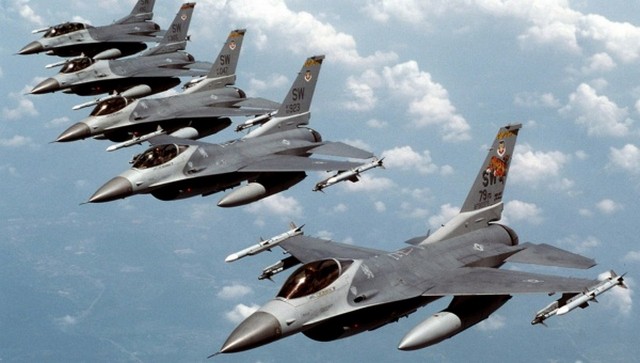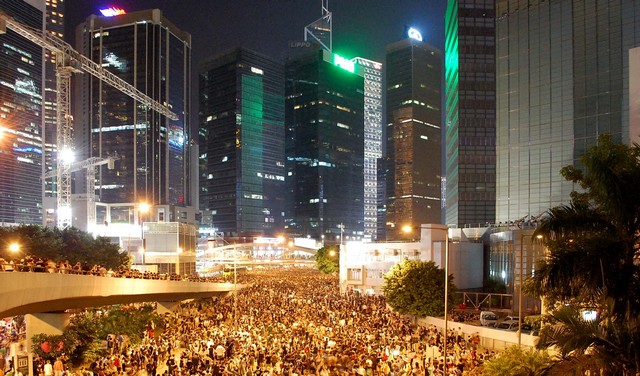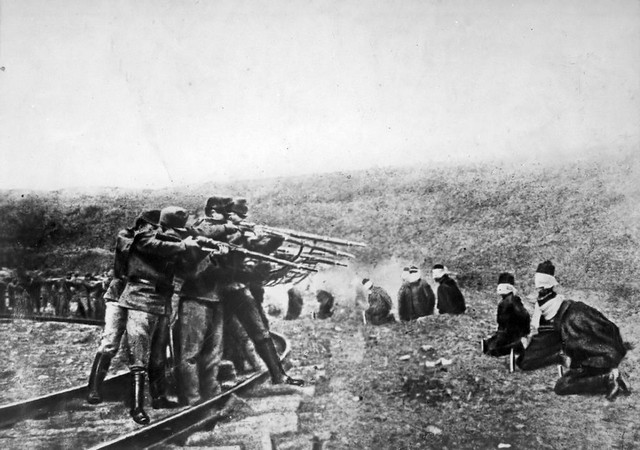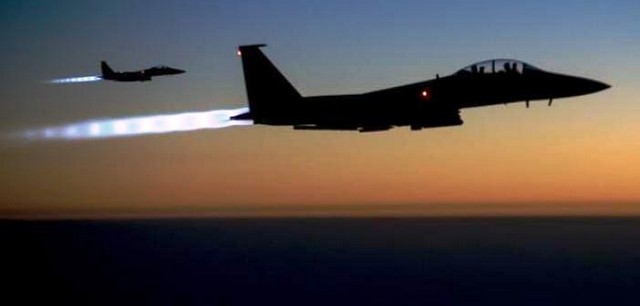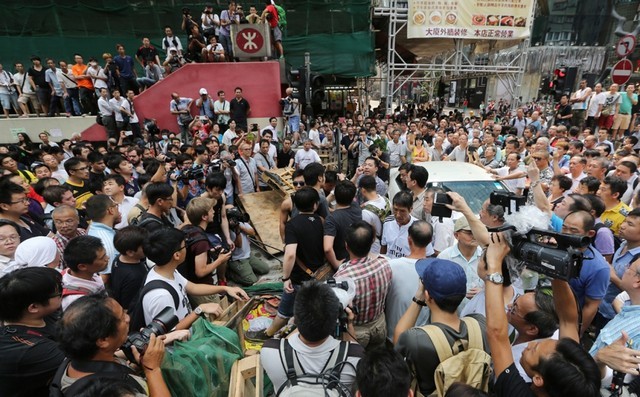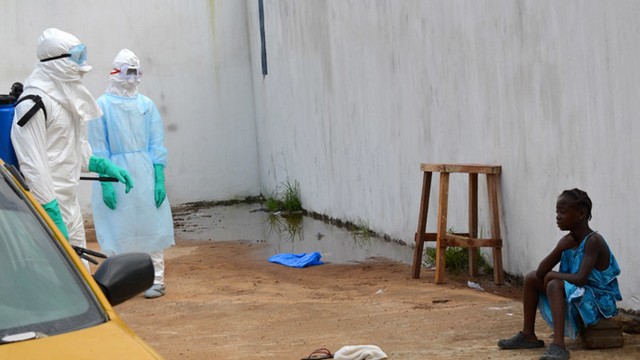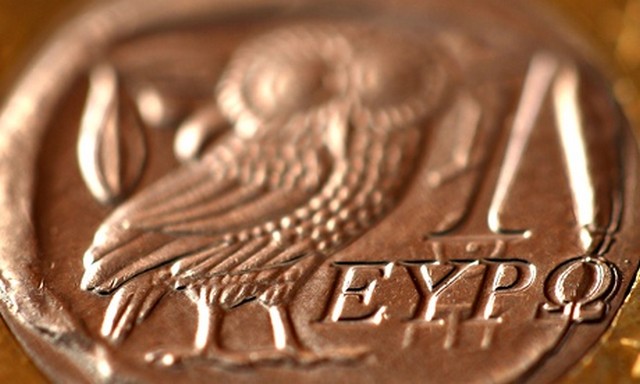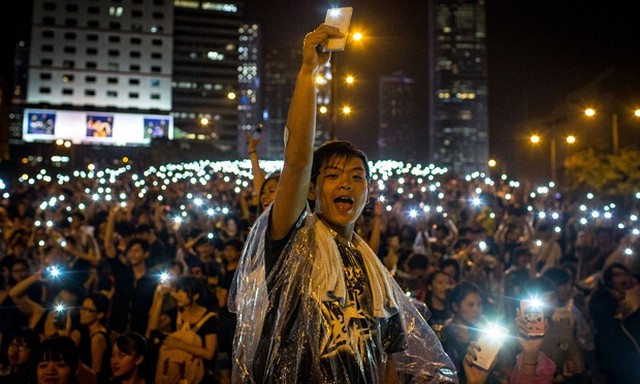By John Pilger
In transmitting President Richard Nixon’s orders for a “massive” bombing of Cambodia in 1969, Henry Kissinger said, “Anything that flies on everything that moves”.
As Barack Obama ignites his seventh war against the Muslim world since he was awarded the Nobel Peace Prize, the orchestrated hysteria and lies make one almost nostalgic for Kissinger’s murderous honesty.
As a witness to the human consequences of aerial savagery – including the beheading of victims, their parts festooning trees and fields – I am not surprised by the disregard of memory and history, yet again.A telling example is the rise to power of Pol Pot and his Khmer Rouge, who had much in common with today’s Islamic State in Iraq and Syria (ISIS). They, too, were ruthless medievalists who began as a small sect. They, too, were the product of an American-made apocalypse, this time in Asia.
According to Pol Pot, his movement had consisted of “fewer than 5,000 poorly armed guerrillas uncertain about their strategy, tactics, loyalty and leaders”. Once Nixon’s and Kissinger’s B52 bombers had gone to work as part of “Operation Menu”, the west’s ultimate demon could not believe his luck.
The Americans dropped the equivalent of five Hiroshimas on rural Cambodia during 1969-73. They levelled village after village, returning to bomb the rubble and corpses. The craters left monstrous necklaces of carnage, still visible from the air. The terror was unimaginable. A former Khmer Rouge official described how the survivors “froze up and they would wander around mute for three or four days. Terrified and half-crazy, the people were ready to believe what they were told … That was what made it so easy for the Khmer Rouge to win the people over.”
A Finnish Government Commission of Enquiry estimated that 600,000 Cambodians died in the ensuing civil war and described the bombing as the “first stage in a decade of genocide”. What Nixon and Kissinger began, Pol Pot, their beneficiary, completed.Under their bombs, the Khmer Rouge grew to a formidable army of 200,000.
ISIS has a similar past and present. By most scholarly measure, Bush and Blair’s invasion of Iraq in 2003 led to the deaths of some 700,000 people — in a country that had no history of jihadism. The Kurds had done territorial and political deals; Sunni and Shia had class and sectarian differences, but they were at peace; intermarriage was common. Three years before the invasion, I drove the length of Iraq without fear. On the way I met people proud, above all, to be Iraqis, the heirs of a civilization that seemed, for them, a presence.
Bush and Blair blew all this to bits. Iraq is now a nest of jihadism. Al-Qaeda – like Pol Pot’s “jihadists” – seized the opportunity provided by the onslaught of Shock and Awe and the civil war that followed. “Rebel” Syria offered even greater rewards, with CIA and Gulf state ratlines of weapons, logistics and money running through Turkey. The arrival of foreign recruits was inevitable. A former British ambassador, Oliver Miles, wrote recently, “The [Cameron] government seems to be following the example of Tony Blair, who ignored consistent advice from the Foreign Office, MI5 and MI6 that our Middle East policy – and in particular our Middle East wars – had been a principal driver in the recruitment of Muslims in Britain for terrorism here.”
ISIS is the progeny of those in Washington and London who, in destroying Iraq as both a state and a society, conspired to commit an epic crime against humanity. Like Pol Pot and the Khmer Rouge, ISIS are the mutations of a western state terror dispensed by a venal imperial elite undeterred by the consequences of actions taken at great remove in distance and culture. Their culpability is unmentionable in “our” societies.
It is 23 years since this holocaust enveloped Iraq, immediately after the first Gulf War, when the US and Britain hijacked the United Nations Security Council and imposed punitive “sanctions” on the Iraqi population – ironically, reinforcing the domestic authority of Saddam Hussein. It was like a medieval siege. Almost everything that sustained a modern state was, in the jargon, “blocked” — from chlorine for making the water supply safe to school pencils, parts for X-ray machines, common painkillers and drugs to combat previously unknown cancers carried in the dust from the southern battlefields contaminated with Depleted Uranium.
Just before Christmas 1999, the Department of Trade and Industry in London restricted the export of vaccines meant to protect Iraqi children against diphtheria and yellow fever. Kim Howells, a medical doctor and parliamentary Under-Secretary of State in the Blair government, explained why. “The children’s vaccines”, he said, “were capable of being used in weapons of mass destruction”. The British Government could get away with such an outrage because media reporting of Iraq – much of it manipulated by the Foreign Office — blamed Saddam Hussein for everything.
Under a bogus “humanitarian” Oil for Food Programme, $100 was allotted for each Iraqi to live on for a year. This figure had to pay for the entire society’s infrastructure and essential services, such as power and water. “Imagine,” the UN Assistant Secretary General, Hans Von Sponeck, told me, “setting that pittance against the lack of clean water, and the fact that the majority of sick people cannot afford treatment, and the sheer trauma of getting from day to day, and you have a glimpse of the nightmare. And make no mistake, this is deliberate. I have not in the past wanted to use the word genocide, but now it is unavoidable.”
Disgusted, Von Sponeck resigned as UN Humanitarian Co-ordinator in Iraq. His predecessor, Denis Halliday, an equally distinguished senior UN official, had also resigned. “I was instructed,” Halliday said, “to implement a policy that satisfies the definition of genocide: a deliberate policy that has effectively killed well over a million individuals, children and adults.”
A study by the United Nations Children’s Fund, Unicef, found that between 1991 and 1998, the height of the blockade, there were 500,000 “excess” deaths of Iraqi infants under the age of five. An American TV reporter put this to Madeleine Albright, US Ambassador to the United Nations, asking her, “Is the price worth it?” Albright replied, “We think the price is worth it.”
In 2007, the senior British official responsible for the sanctions, Carne Ross, known as “Mr. Iraq”, told a parliamentary selection committee, “[The US and UK governments] effectively denied the entire population a means to live.”When I interviewed Carne Ross three years later, he was consumed by regret and contrition. “I feel ashamed,” he said. He is today a rare truth-teller of how governments deceive and how a compliant media plays a critical role in disseminating and maintaining the deception. “We would feed [journalists] factoids of sanitised intelligence,” he said, “or we’d freeze them out.”
On 25 September, a headline in the Guardian read: “Faced with the horror of Isis we must act.”The “we must act” is a ghost risen, a warning of the suppression of informed memory, facts, lessons learned and regrets or shame. The author of the article was Peter Hain, the former Foreign Office minister responsible for Iraq under Blair. In 1998, when Denis Halliday revealed the extent of the suffering in Iraq for which the Blair Government shared primary responsibility, Hain abused him on the BBC’s Newsnight as an “apologist for Saddam”. In 2003, Hain backed Blair’s invasion of stricken Iraq on the basis of transparent lies. At a subsequent Labour Party conference, he dismissed the invasion as a “fringe issue”.
Now Hain is demanding “air strikes, drones, military equipment and other support” for those “facing genocide” in Iraq and Syria. This will further “the imperative of a political solution”. Obama has the same in mind as he lifts what he calls the “restrictions” on US bombing and drone attacks. This means that missiles and 500-pound bombs can smash the homes of peasant people, as they are doing without restriction in Yemen, Pakistan, Afghanistan and Somalia — as they did in Cambodia, Vietnam and Laos. On 23 September, a Tomahawk cruise missile hit a village in Idlib Province in Syria, killing as many as a dozen civilians, including women and children. None waved a black flag.
The day Hain’s article appeared, Denis Halliday and Hans Von Sponeck happened to be in London and came to visit me. They were not shocked by the lethal hypocrisy of a politician, but lamented the enduring, almost inexplicable absence of intelligent diplomacy in negotiating a semblance of truce. Across the world, from Northern Ireland to Nepal, those regarding each other as terrorists and heretics have faced each other across a table. Why not now in Iraq and Syria.
Like Ebola from West Africa, a bacteria called “perpetual war” has crossed the Atlantic. Lord Richards, until recently head of the British military, wants “boots on the ground” now. There is a vapid, almost sociopathic verboseness from Cameron, Obama and their “coalition of the willing” – notably Australia’s aggressively weird Tony Abbott — as they prescribe more violence delivered from 30,000 feet on places where the blood of previous adventures never dried. They have never seen bombing and they apparently love it so much they want it to overthrow their one potentially valuable ally, Syria. This is nothing new, as the following leaked UK-US intelligence file illustrates:
“In order to facilitate the action of liberative [sic] forces … a special effort should be made to eliminate certain key individuals [and] to proceed with internal disturbances in Syria. CIA is prepared, and SIS (MI6) will attempt to mount minor sabotage and coup de main [sic] incidents within Syria, working through contacts with individuals… a necessary degree of fear… frontier and [staged] border clashes [will] provide a pretext for intervention… the CIA and SIS should use… capabilities in both psychological and action fields to augment tension.”
That was written in 1957, though it could have been written yesterday. In the imperial world, nothing essentially changes. Last year, the former French Foreign Minister Roland Dumas revealed that “two years before the Arab spring”, he was told in London that a war on Syria was planned.“I am going to tell you something,” he said in an interview with the French TV channel LPC, “I was in England two years before the violence in Syria on other business. I met top British officials, who confessed to me that they were preparing something in Syria … Britain was organising an invasion of rebels into Syria. They even asked me, although I was no longer Minister for Foreign Affairs, if I would like to participate … This operation goes way back. It was prepared, preconceived and planned.”
The only effective opponents of ISIS are accredited demons of the west – Syria, Iran, Hezbollah.The obstacle is Turkey, an “ally” and a member of Nato, which has conspired with the CIA, MI6 and the Gulf medievalists to channel support to the Syrian “rebels”, including those now calling themselves ISIS. Supporting Turkey in its long-held ambition for regional dominance by overthrowing the Assad government beckons a major conventional war and the horrific dismemberment of the most ethnically diverse state in the Middle East.
A truce – however difficult to achieve – is the only way out of this imperial maze; otherwise, the beheadings will continue. That genuine negotiations with Syria should be seen as “morally questionable” (the Guardian) suggests that the assumptions of moral superiority among those who supported the war criminal Blair remain not only absurd, but dangerous.
Together with a truce, there should be an immediate cessation of all shipments of war materials to Israel and recognition of the State of Palestine. The issue of Palestine is the region’s most festering open wound, and the oft-stated justification for the rise of Islamic extremism. Osama bin Laden made that clear. Palestine also offers hope. Give justice to the Palestinians and you begin to change the world around them.
More than 40 years ago, the Nixon-Kissinger bombing of Cambodia unleashed a torrent of suffering from which that country has never recovered. The same is true of the Blair-Bush crime in Iraq. With impeccable timing, Henry Kissinger’s latest self-serving tome has just been released with its satirical title, “World Order”. In one fawning review, Kissinger is described as a “key shaper of a world order that remained stable for a quarter of a century”. Tell that to the people of Cambodia, Vietnam, Laos, Chile, East Timor and all the other victims of his “statecraft”. Only when “we” recognise the war criminals in our midst will the blood begin to dry.
John Pilger is a London-based journalist, film-maker and author.
9 October 2014

